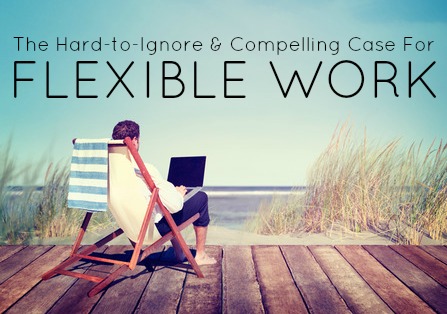69% of Millennials believe office attendance is unnecessary on a regular basis. And 79% of Millennials would rather be mobile than static while working. While Millennials expect a level of flexibility at work; technology, globalization, and the cloud have made flexible working a new reality.
The 175,000 employee company, Unilever, has a goal to have 30% of its roles be location-independent. To accomplish this Unilever has created what it calls Agile Working, which allows employees to work anywhere and anytime provided they meet their goals and responsibilities.
This has been the biggest work shift at the company in more than 20 years; but it recognizes that it must be done if it is to remain competitive going forward and achieve its goals.
Flexible work is often described as “working anywhere at anytime.” Many organizations (especially larger, more established companies) continue to struggle with the idea of flexible work arrangements. I believe a key factor in overcoming flex wok fear is to embrace the idea of managing output vs input only.
Below are some compelling flexible workforce statistics according to Jacob Morgan’s The Future of Work: Attract New Talent, Build Better Leaders, and Create a Competitive Organization.
- 90% of employees believe that an organization that offers flexible work environments is more attractive to prospective hires than one that doesn’t.
- In 2013, 600,000 employees in the United States travel 90 minutes and 50 miles to work (each way) and 10.8 million employees travel an hour each way. (U.S. Census Bureau)
- 26,000 business managers across 90 countries revealed that 48% of them are now working remotely for at least half of their work week. (2013 Regus Global Economic Indicator)
- 58% of human resource professionals cite flexibility as the most effective way to attract new talent. (Society for Human Resource Management)
- 45% of working adults would be willing to take around a 9% pay cut to be able to have a more flexible work schedule. (MomCorps)
- 73% of working adults look at flexibility as one of the most important factors when considering looking for a new job or deciding what company they should work for. This number has increased by over 10% since 2012. (MomCorps)
- Employees who have longer commutes have more recurring neck or back pain, higher cholesterol, experience more worry, and experience less enjoyment. (Gallup-Healthways Well-Being Index)
- Aetna, an organization with around 35,000 employees around the world, sees around half of its workforce working from home, which has saved it around $80 million in real estate costs annually and a voluntary turnover rate of those who work at home, which is around 2 to 3 percent (compared to the 8 percent industry average).
- Intel, which employs more than 100,000 people around the world, has more than 80 percent of its employees regularly working from home.
- Half of managers said that employees would gain an average of 7 hours in productivity each week if they were enabled to work via mobile devices. (AOL9 Government Mobile Technology)
- Sociologist T. J. Allen, found that once employees are approximately 200 feet away from each other, their chances of communicating and collaborating falls to zero.
Related Read: 3 Shifts Every Employee Needs To Consider In Order To Thrive Tomorrow Other organizations are finding new ways to ease themselves into this new way of working:
Schneider Electric has developed 3 individual mobility profiles for its employees: “Resident,” which includes employees who are situated at the office for more than 65% of all working hours, “flexible,” which includes employees who are situated at the office from 30-65% of all working hours, and “nomad,” which includes employees who are situated at the offices for less than 30% of all working hours.
Flexible work is all about giving employees the freedom of choice instead of mandating a rigid way of working. Could flex work be a growth catalyst for your organization?
Question: How much of your workday is remote?






